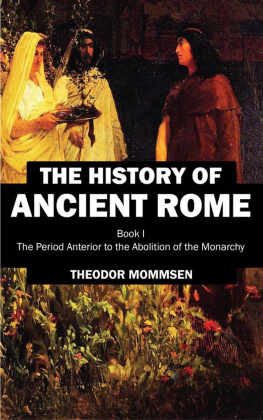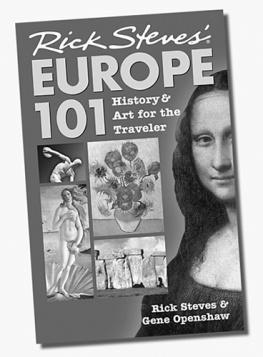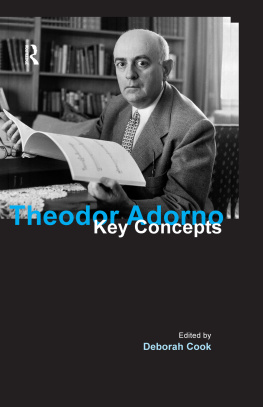Theodor Mommsen - The history of Rome. Book V
Here you can read online Theodor Mommsen - The history of Rome. Book V full text of the book (entire story) in english for free. Download pdf and epub, get meaning, cover and reviews about this ebook. genre: Science. Description of the work, (preface) as well as reviews are available. Best literature library LitArk.com created for fans of good reading and offers a wide selection of genres:
Romance novel
Science fiction
Adventure
Detective
Science
History
Home and family
Prose
Art
Politics
Computer
Non-fiction
Religion
Business
Children
Humor
Choose a favorite category and find really read worthwhile books. Enjoy immersion in the world of imagination, feel the emotions of the characters or learn something new for yourself, make an fascinating discovery.

- Book:The history of Rome. Book V
- Author:
- Genre:
- Rating:3 / 5
- Favourites:Add to favourites
- Your mark:
- 60
- 1
- 2
- 3
- 4
- 5
The history of Rome. Book V: summary, description and annotation
We offer to read an annotation, description, summary or preface (depends on what the author of the book "The history of Rome. Book V" wrote himself). If you haven't found the necessary information about the book — write in the comments, we will try to find it.
The history of Rome. Book V — read online for free the complete book (whole text) full work
Below is the text of the book, divided by pages. System saving the place of the last page read, allows you to conveniently read the book "The history of Rome. Book V" online for free, without having to search again every time where you left off. Put a bookmark, and you can go to the page where you finished reading at any time.
Font size:
Interval:
Bookmark:
version="1.0" encoding="windows-1251"?>sci_historysci_cultureTheodorMommsenThe history of Rome. Book V
The History of Rome by Theodor Mommsen, translated by William Purdie Dickson
endeshoomowshoomow@gmail.comFB Editor v2.0, FB Writer v1.118 August 2009EA9B20C7-E14E-4624-B69B-8EE03D75C7C61.0Ver 1.0 - , (The Project Gutenberg, www.gutenberg.net). (David Ceponis).
Theodor Mommsen
The history of Rome. Book V
THE HISTORY OF ROME. BOOK V
The Establishment of the Military Monarchy
by THEODOR MOMMSEN
Translated with the Sanction of the Author
by William Purdie Dickson, D.D., LL.D. Professor of Divinity in the University of Glasgow
CONTENTS
BOOK V: The Establishment of the Military Monarchy
I. Marcus Lepidus and Quintus Sertorius
II. Rule of the Sullan Restoration
III. The Fall of the Oligarchy and the Rule of Pompeius
IV. Pompeius and the East
V. The Struggle of Parties during the Absence of Pompeius
VI. Retirement of Pompeius and Coalition of the Pretenders
VII. The Subjugation of the West
VIII. The Joint Rule of Pompeius and Caesar
IX. Death of Crassus - Rupture between the Joint Rulers
X. Brundisium, Ilerda, Pharsalus, and Thapsus
XI. The Old Republic and the New Monarchy
XII. Religion, Culture, Literature, and Art
BOOK FIFTH
The Establishment of the Military Monarchy
Wie er sich sieht so um und um,
Kehrt es ihm fast den Kopf herum,
Wie er wollt' Worte zu allem finden?
Wie er mocht' so viel Schwall verbinden?
Wie er mocht' immer muthig bleiben
So fort und weiter fort zu schreiben?
GoetheChapter I
Marcus Lepidus and Quintus Sertorius
When Sulla died in the year 676, the oligarchy which he had restored ruled with absolute sway over the Roman state; but, as it had been established by force, it still needed force to maintain its ground against its numerous secret and open foes.
It was opposed not by any single party with objects clearly expressed and under leaders distinctly acknowledged, but by a mass of multifarious elements, ranging themselves doubtless under the general name of the popular party, but in reality opposing the Sullan organization of the commonwealth on very various grounds and with very different designs. There were the men of positive law who neither mingled in nor understood politics, but who detested the arbitrary procedure of Sulla in dealing with the lives and property of the burgesses. Even during Sulla's lifetime, when all other opposition was silent, the strict jurists resisted the regent; the Cornelian laws, for example, which deprived various Italian communities of the Roman franchise, were treated in judicial decisions as null and void; and in like manner the courts held that, where a burgess had been made a prisoner of war and sold into slavery during the revolution, his franchise was not forfeited.
There was, further, the remnant of the old liberal minority in the senate, which in former times had laboured to effect a compromise with the reform party and the Italians, and was now in a similar spirit inclined to modify the rigidly oligarchic constitution of Sulla by concessions to the Populares. There were, moreover, the Populares strictly so called, the honestly credulous narrow-minded radicals, who staked property and life for the current watchwords of the party-programme, only to discover with painful surprise after the victory that they had been fighting not for a reality, but for a phrase.
Their special aim was to re-establish the tribunician power, which Sulla had not abolished but had divested of its most essential prerogatives, and which exercised over the multitude a charm all the more mysterious, because the institution had no obvious practical use and was in fact an empty phantom - the mere name of tribune of the people, more than a thousand years later, revolutionized Rome.
Transpadanes - Freedmen - Capitalists - Proletarians of the Capital - The Dispossessed - The Proscribed and Their AdherentsThere were, above all, the numerous and important classes whom the Sullan restoration had left unsatisfied, or whose political or private interests it had directly injured. Among those who for such reasons belonged to the opposition ranked the dense and prosperous population of the region between the Po and the Alps, which naturally regarded the bestowal of Latin rights in 665, had thereby virtually received from the law itself a summons to rise in rebellion against the existing order of things.
Men of Ruined Fortunes - Men of AmbitionTo all these sections of the opposition there was added the whole body of men of ruined fortunes. All the rabble high and low, whose means and substance had been spent in refined or in vulgar debauchery; the aristocratic lords, who had no farther mark of quality than their debts; the Sullan troopers whom the regent's fiat could transform into landholders but not into husbandmen, and who, after squandering the first inheritance of the proscribed, were longing to succeed to a second - all these waited only the unfolding of the banner which invited them to fight against the existing order of things, whatever else might be inscribed on it.
From a like necessity all the aspiring men of talent, in search of popularity, attached themselves to the opposition; not only those to whom the strictly closed circle of the Optimates denied admission or at least opportunities for rapid promotion, and who therefore attempted to force their way into the phalanx and to break through the laws of oligarchic exclusiveness and seniority by means of popular favour, but also the more dangerous men, whose ambition aimed at something higher than helping to determine the destinies of the world within the sphere of collegiate intrigues.
On the advocates' platform in particular - the only field of legal opposition left open by Sulla - even in the regent's lifetime such aspirants waged lively war against the restoration with the weapons of formal jurisprudence and combative oratory: for instance, the adroit speaker Marcus Tullius Cicero (born 3rd January 648), son of a landholder of Arpinum, speedily made himself a name by the mingled caution and boldness of his opposition to the dictator.
Such efforts were not of much importance, if the opponent desired nothing farther than by their means to procure for himself a curule chair, and then to sit in it in contentment for the rest of his life. No doubt, if this chair should not satisfy a popular man and Gaius Gracchus should find a successor, a struggle for life or death was inevitable; but for the present at least no name could be mentioned, the bearer of which had proposed to himself any such lofty aim.
Power of the OppositionSuch was the sort of opposition with which the oligarchic government instituted by Sulla had to contend, when it had, earlier than Sulla himself probably expected, been thrown by his death on its own resources. The task was in itself far from easy, and it was rendered more difficult by the other social and political evils of this age - especially by the extraordinary double difficulty of keeping the military chiefs in the provinces in subjection to the supreme civil magistracy, and of dealing with the masses of the Italian and extra-Italian populace accumulating in the capital, and of the slaves living there to a great extent in de facto freedom, without having troops at disposal. The senate was placed as it were, in a fortress exposed and threatened on all sides, and serious conflicts could not fail to ensue. But the means of resistance organized by Sulla were considerable and lasting; and although the majority of the nation was manifestly disinclined to the government which Sulla had installed, and even animated by hostile feelings towards it, that government might very well maintain itself for a long time in its stronghold against the distracted and confused mass of an opposition which was not agreed either as to end or means, and, having no head, was broken up into a hundred fragments. Only it was necessary that it should be determined to maintain its position, and should bring at least a spark of that energy, which had built the fortress, to its defence; for in the case of a garrison which will not defend itself, the greatest master of fortification constructs his walls and moats in vain.
Next pageFont size:
Interval:
Bookmark:
Similar books «The history of Rome. Book V»
Look at similar books to The history of Rome. Book V. We have selected literature similar in name and meaning in the hope of providing readers with more options to find new, interesting, not yet read works.
Discussion, reviews of the book The history of Rome. Book V and just readers' own opinions. Leave your comments, write what you think about the work, its meaning or the main characters. Specify what exactly you liked and what you didn't like, and why you think so.





